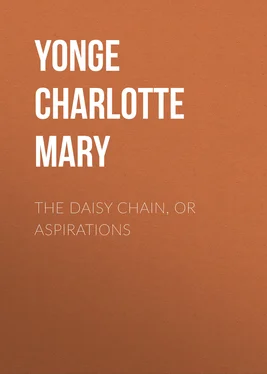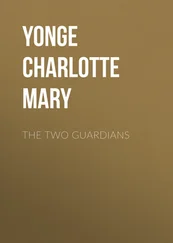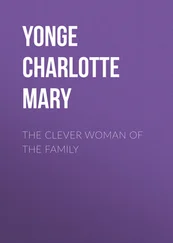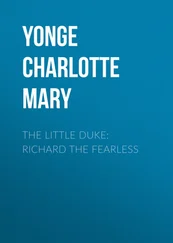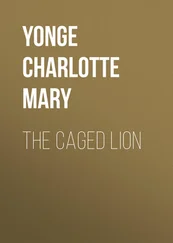Charlotte Yonge - The Daisy Chain, or Aspirations
Здесь есть возможность читать онлайн «Charlotte Yonge - The Daisy Chain, or Aspirations» — ознакомительный отрывок электронной книги совершенно бесплатно, а после прочтения отрывка купить полную версию. В некоторых случаях можно слушать аудио, скачать через торрент в формате fb2 и присутствует краткое содержание. Жанр: foreign_prose, literature_19, Европейская старинная литература, foreign_antique, на английском языке. Описание произведения, (предисловие) а так же отзывы посетителей доступны на портале библиотеки ЛибКат.
- Название:The Daisy Chain, or Aspirations
- Автор:
- Жанр:
- Год:неизвестен
- ISBN:нет данных
- Рейтинг книги:5 / 5. Голосов: 1
-
Избранное:Добавить в избранное
- Отзывы:
-
Ваша оценка:
- 100
- 1
- 2
- 3
- 4
- 5
The Daisy Chain, or Aspirations: краткое содержание, описание и аннотация
Предлагаем к чтению аннотацию, описание, краткое содержание или предисловие (зависит от того, что написал сам автор книги «The Daisy Chain, or Aspirations»). Если вы не нашли необходимую информацию о книге — напишите в комментариях, мы постараемся отыскать её.
The Daisy Chain, or Aspirations — читать онлайн ознакомительный отрывок
Ниже представлен текст книги, разбитый по страницам. Система сохранения места последней прочитанной страницы, позволяет с удобством читать онлайн бесплатно книгу «The Daisy Chain, or Aspirations», без необходимости каждый раз заново искать на чём Вы остановились. Поставьте закладку, и сможете в любой момент перейти на страницу, на которой закончили чтение.
Интервал:
Закладка:
“Isn’t it! I remember that as long as I remember anything. All this fine rolling of turf, and trimming up of the place, does not make much difference to you, old fellow, does it? You don’t look altered since I saw you last, when old Jervis was letting the place go to rack and ruin. So they have a new entrance—very handsome conservatory—flowers—the banker does things in style. There,” as Norman helped him off with his plaid, “wrap yourself up well, don’t get cold. The sun is gone in, and I should not wonder if the rain were coming after all. I’ll not be longer than I can help.”
Dr. May disappeared from his son’s sight through the conservatory, where, through the plate-glass, the exotics looked so fresh and perfumy, that Norman almost fancied that the scent reached him. “How much poor Margaret would enjoy one of those camellias,” thought he, “and these people have bushels of them for mere show. If I were papa, I should be tempted to be like Beauty’s father, and carry off one. How she would admire it!”
Norman had plenty of time to meditate on the camellias, and then to turn and speculate on the age of the cedar, whether it could have been planted by the monks of Stoneborough Abbey, to whom the Grange had belonged, brought from Lebanon by a pilgrim, perhaps; and then he tried to guess at the longevity of cedars, and thought of asking Margaret, the botanist of the family. Then he yawned, moved the horse a little about, opined that Mr. Rivers must be very prosy, or have some abstruse complaint, considered the sky, and augured rain, buttoned another button of his rough coat, and thought of Miss Cleveland’s dinner. Then he thought there was a very sharp wind, and drove about till he found a sheltered place on the lee side of the great cedar, looked up at it, and thought it would be a fine subject for verses, if Mr. Wilmot knew of it, and then proceeded to consider what he should make of them.
In the midst he was suddenly roused by the deep-toned note of a dog, and beheld a large black Newfoundland dog leaping about the horse in great indignation. “Rollo! Rollo!” called a clear young voice, and he saw two ladles returning from a walk. Rollo, at the first call, galloped back to his mistress, and was evidently receiving an admonition, and promising good behaviour. The two ladies entered the house, while he lay down on the step, with his lion-like paw hanging down, watching Norman with a brilliant pair of hazel eyes. Norman, after a little more wondering when Mr. Rivers would have done with his father, betook himself to civil demonstrations to the creature, who received them with dignity, and presently, after acknowledging with his tail, various whispers of “Good old fellow,” and “Here, old Rollo!” having apparently satisfied himself that the young gentleman was respectable, he rose, and vouchsafed to stand up with his forepaws in the gig, listening amiably to Norman’s delicate flatteries. Norman even began to hope to allure him into jumping on the seat: but a great bell rang, and Rollo immediately turned round, and dashed off, at full speed, to some back region of the house. “So, old fellow, you know what the dinner-bell means,” thought Norman. “I hope Mr. Rivers is hungry too. Miss Cleveland will have eaten up her whole luncheon, if this old bore won’t let my father go soon! I hope he is desperately ill—‘tis his only excuse! Heigh ho! I must jump out to warm my feet soon! There, there’s a drop of rain! Well, there’s no end to it! I wonder what Ethel is doing about Cocksmoor! It is setting in for a wet afternoon!” and Norman disconsolately put up his umbrella.
At last Dr. May and another gentleman were seen in the conservatory, and Norman gladly proceeded to clear the seat; but Dr. May called out, “Jump out, Norman, Mr. Rivers is so kind as to ask us to stay to luncheon.”
With boyish shrinking from strangers, Norman privately wished Mr. Rivers at Jericho, as he gave the reins to a servant, and entered the conservatory, where a kindly hand was held out to him by a gentleman of about fifty, with a bald smooth forehead, soft blue eyes, and gentle pleasant face. “Is this your eldest son?” said he, turning to Dr. May—and the manner of both was as if they were already well acquainted. “No, this is my second. The eldest is not quite such a long-legged fellow,” said Dr. May. And then followed the question addressed to Norman himself, where he was at school.
“At Stoneborough,” said Norman, a little amused at the thought how angry Ethel and Harry would be that the paragraph of the county paper, where “N. W. May” was recorded as prizeman and foremost in the examination, had not penetrated even to Abbotstoke Grange, or rather to its owner’s memory.
However, his father could not help adding, “He is the head of the school—a thing we Stoneborough men think much of.”
This, and Mr. Rivers’s civil answer, made Norman so hot, that he did not notice much in passing through a hall full of beautiful vases, stuffed birds, busts, etc., tastefully arranged, and he did not look up till they were entering a handsome dining-room, where a small square table was laid out for luncheon near a noble fire.
The two ladies were there, and Mr. Rivers introduced them as his daughter and Mrs. Larpent. It was the most luxurious meal that Norman had ever seen, the plate, the porcelain, and all the appointments of the table so elegant, and the viands, all partaking of the Christmas character, and of a recherche delicate description quite new to him. He had to serve as his father’s right hand, and was so anxious to put everything as Dr. May liked it, and without attracting notice, that he hardly saw or listened till Dr. May began to admire a fine Claude on the opposite wall, and embarked in a picture discussion. The doctor had much taste for art, and had made the most of his opportunities of seeing paintings during his time of study at Paris, and in a brief tour to Italy. Since that time, few good pictures had come in his way, and these were a great pleasure to him, while Mr. Rivers, a regular connoisseur, was delighted to meet with one who could so well appreciate them. Norman perceived how his father was enjoying the conversation, and was much interested both by the sight of the first fine paintings he had ever seen, and by the talk about their merits; but the living things in the room had more of his attention and observation, especially the young lady who sat at the head of the table; a girl about his own age; she was on a very small scale, and seemed to him like a fairy, in the airy lightness and grace of her movements, and the blithe gladsomeness of her gestures and countenance. Form and features, though perfectly healthful and brisk, had the peculiar finish and delicacy of a miniature painting, and were enhanced by the sunny glance of her dark soft smiling eyes. Her hair was in black silky braids, and her dress, with its gaiety of well-assorted colour, was positively refreshing to his eye, so long accustomed to the deep mourning of his sisters. A little Italian greyhound, perfectly white, was at her side, making infinite variations of the line of beauty and grace, with its elegant outline, and S-like tail, as it raised its slender nose in hopes of a fragment of bread which she from time to time dispensed to it.
Luncheon over, Mr. Rivers asked Dr. May to step into his library, and Norman guessed that they had been talking all this time, and had never come to the medical opinion. However, a good meal and a large fire made a great difference in his toleration, and it was so new a scene, that he had no objection to a prolonged waiting, especially when Mrs. Larpent said, in a very pleasant tone, “Will you come into the drawing-room with us?”
He felt somewhat as if he was walking in enchanted ground as he followed her into the large room, the windows opening into the conservatory, the whole air fragrant with flowers, the furniture and ornaments so exquisite of their kind, and all such a fit scene for the beautiful little damsel, who, with her slender dog by her side, tripped on demurely, and rather shyly, but with a certain skipping lightness in her step. A very tall overgrown schoolboy did Norman feel himself for one bashful moment, when he found himself alone with the two ladies; but he was ready to be set at ease by Mrs. Larpent’s good-natured manner, when she said something of Rollo’s discourtesy. He smiled, and answered that he had made great friends with the fine old dog, and spoke of his running off to the dinner, at which little Miss Rivers laughed, and looked delighted, and began to tell of Rollo’s perfections and intelligence. Norman ventured to inquire the name of the little Italian, and was told it was Nipen, because it had once stolen a cake, much like the wind-spirit in Feats on the Fiord. Its beauty and tricks were duly displayed, and a most beautiful Australian parrot was exhibited, Mrs. Larpent taking full interest in the talk, in so lively and gentle a manner, and she and her pretty pupil evidently on such sister-like terms, that Norman could hardly believe her to be the governess, when he thought of Miss Winter.
Читать дальшеИнтервал:
Закладка:
Похожие книги на «The Daisy Chain, or Aspirations»
Представляем Вашему вниманию похожие книги на «The Daisy Chain, or Aspirations» списком для выбора. Мы отобрали схожую по названию и смыслу литературу в надежде предоставить читателям больше вариантов отыскать новые, интересные, ещё непрочитанные произведения.
Обсуждение, отзывы о книге «The Daisy Chain, or Aspirations» и просто собственные мнения читателей. Оставьте ваши комментарии, напишите, что Вы думаете о произведении, его смысле или главных героях. Укажите что конкретно понравилось, а что нет, и почему Вы так считаете.
